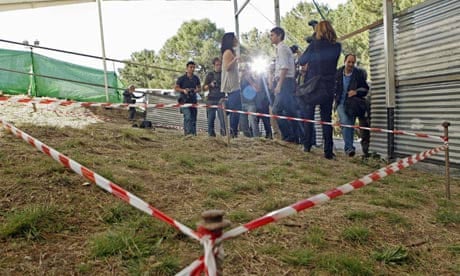One of the greatest mysteries of recent Spanish history will remain unsolved for the foreseeable future, after a team of archeologists admitted they had failed to find the grave of poet and playwright Federico García Lorca.
"There was not a single bone, or fragment of bone," said Francisco Corrión, leader of the team that has spent six weeks digging at the site where Lorca was thought to be buried. "There is no chance of it being there."
García Lorca was the most famous victim of the death squads operating in territory controlled by General Francisco Franco's rightwing nationalists during the Spanish civil war.
Until today he was assumed to have been buried in a mass grave with several other death squad victims on a hillside in Alfacar, overlooking his home city of Granada.
The spot was identified three decades ago by a man who claimed to have helped dig the grave into which the author of Blood Wedding and Yerma was thrown, after being shot by a dawn firing squad of rightwing radicals in 1936.
After years of debate about what to do with the site, which had been turned into a park bearing Lorca's name, local authorities ignored opposition from the poet's family and began to excavate.
Today , however, the scientists involved said a thin layer of soil gave on to hard rock, leaving no space for anyone to dig a grave.
"No human remains have appeared, nor are there any signs of civil war graves," the team from Granada University, which investigated six potential grave spots, said in a report. "We believe that no graves were ever dug in the area we have studied. The study is conclusive and leaves no room for doubt."
The failed dig has brought the official quest for Lorca's remains to an end. "We are not going to be drilling holes all over Granada," said Juan Gallo of the regional government of Andalucia, which funded the dig.
"It is a challenge," said Maribel Brenes, head of an NGO dedicated to finding the graves of Franco's victims. "The investigation will have to start again from the very beginning."
